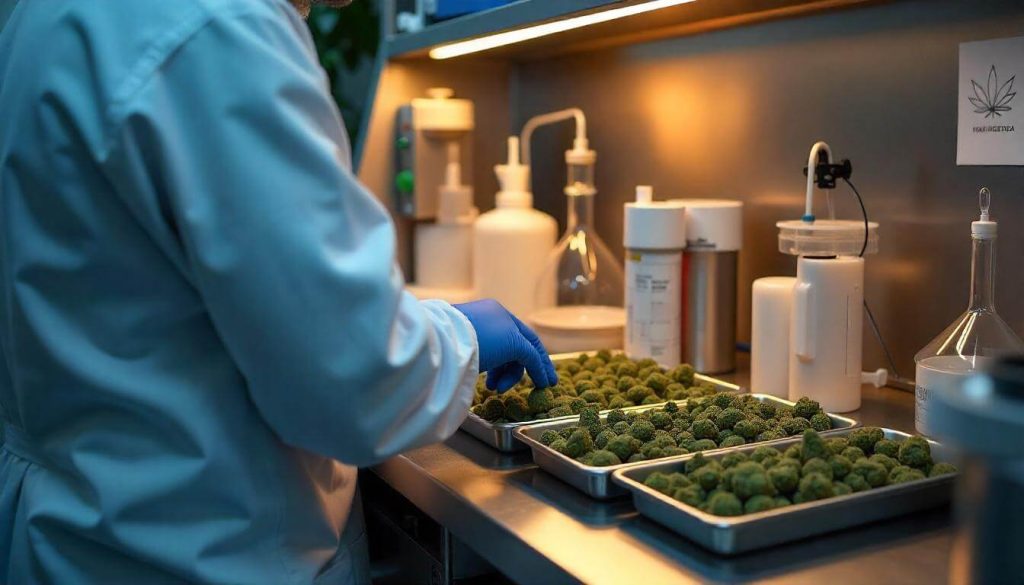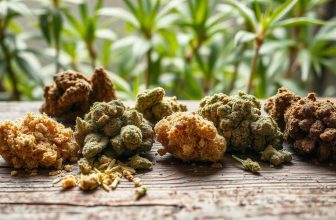THCA, or tetrahydrocannabinolic acid, is a non-psychoactive cannabinoid found in fresh cannabis. Unlike THC, it does not produce a euphoric effect. However, it plays an essential role in understanding the effects of cannabis. Let's find out what THCA is and how it differs from THC.
Notable differences between THC and THCA
These two compounds come from the same plant, but their chemical properties and effects on the body are quite distinct.
THCA is the acid form of THC. In fresh cannabis, THCA is abundant and has no psychoactive properties. In other words, it won't get you high. It must undergo decarboxylation to transform into THC. This happens when cannabis is heated, for example during vaporization, combustion or cooking.
Chemically speaking, the major difference between THC and THCA lies in the presence of a carboxyl group (COOH) in THCA. This extra group prevents it from binding to the cannabinoid receptors in the brain, the very receptors that give THC its euphoric effect. On the other hand, once decarboxylated to THC, the compound can easily bind to these receptors to produce its psychoactive effects.
Potential effects of THCA
Although less studied than THC, THCA has interesting properties that are attracting the attention of researchers.
Preliminary studies show that this molecule could help reduce inflammation, enabling the treatment of chronic diseases such as arthritis. By acting on inflammatory pathways, THCA could offer relief without the psychoactive effects associated with THC.
Other research suggests that it may help protect nerve cells. Neurodegenerative diseases such as Alzheimer's, Parkinson's or multiple sclerosis could benefit.
THCA is also being studied for its antiemetic properties, i.e. its ability to reduce nausea and vomiting. This could be particularly useful for patients undergoing chemotherapy or suffering from severe digestive disorders.
Finally, although analyses are still underway, THCA shows potential in pain management. By acting on its receptors, it could offer significant relief to people suffering from chronic inflammation.
How is THCA extracted and consumed?
THCA extraction often begins with the harvesting of fresh cannabis. Common techniques include the use of solvents such as ethanol or butane to separate the cannabinoids from the plant. Once extracted, it can be purified and crystallized to create “diamonds”. These crystals are among the purest forms of THCA available on the market.
They are highly prized for their high concentration and purity, and can be consumed in a variety of ways, including vaporization. When heated, they are converted into THC. However, if you want to avoid the psychoactive effects, you can consume THCA without heating it. For example, you can put fresh cannabis leaves and flowers in your smoothies or juices.
THCA can also be incorporated into tinctures and oils. These products enable easy, precise and convenient administration. Placed under the tongue, they are rapidly absorbed by the body. You can also add your oils to foods or drinks.
Finally, consumers can use THCA transdermal patches, which deliver the cannabinoid directly through the skin. This method offers a slow, steady release of the molecule, ideal for ongoing symptom management without the psychoactive effects of THC.
THCA laws and availability

THCA legislation varies widely from country to country, and has a direct influence on its availability on the market.
In the United States, THCA is generally legal in its raw state, i.e. before decarboxylation. Federal cannabis laws may differ, but THCA is not considered a controlled substance until it is converted to THC. This allows some companies to sell THCA-based products, such as tinctures and crystals, in states where recreational cannabis is legal. However, once heated and converted to THC, it falls under strict THC regulations.
In Europe, the situation is more complex. THCA is not specifically regulated in the same way as THC. However, the sale, possession and use of products based on this molecule are often included in the same global rules as cannabis. You should therefore check your local laws before buying or using any.
In France, for example, cannabis and its derivatives are illegal, with a few very specific exceptions. Although THCA is not explicitly mentioned, it is often included in this prohibition.
What does the future hold for THCA?
THCA differs from THC in that it is non-psychoactive.
Scientific research continues to discover new properties and potential applications for this molecule, although it may already be anti-inflammatory, neuroprotective and antiemetic.
To preserve all the benefits of THCA and consume it pure, add leaves or flowers to your drinks, tinctures or oils.
In terms of legislation, always take the time to check the rules of the country you're in.
Follow us on 
Join the Community
Don't miss any news with our newsletter





